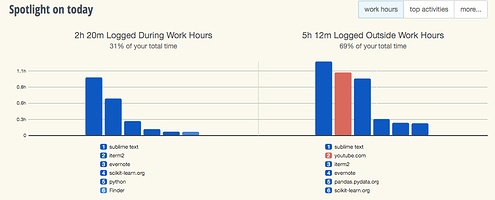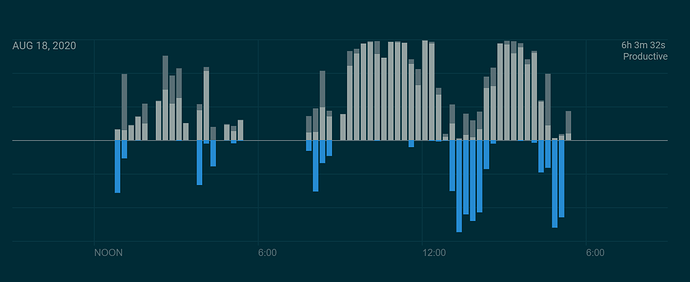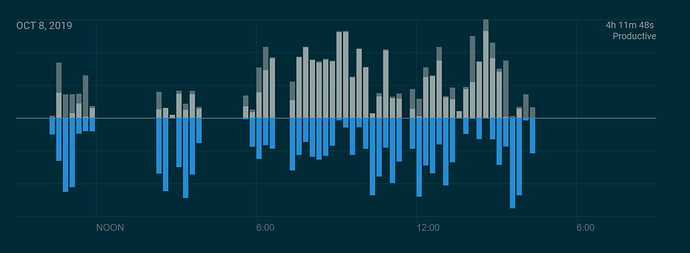Hi Michał
As @ejain points out, actively tracking flow would disrupt the flow state, whilst passively tracking a subjective experience like flow is difficult/impossible. I can think of some potential high-tech solutions we might explore as a community in the future, but for now I have some suggestions based on my own experience tracking flow / Deep Work.
If most of the time you spend working is on a computer, you could install RescueTime and use the free tier to automatically track how much time you spend on productive sites/applications vs. unproductive ones (as you define them in the settings). In my case, time I spend in coding IDEs, PDF readers, or work processors is considered highly productive and time spent on social media sites is considered distracting.
fig 1. Today’s productivity on RescueTime
I also use other task-specific tools like WakaTime to track time spent coding (which is a large portion of my meaningful work), but that may not be relevant to you right now.
Along with this passive RescueTime data, I keep a retrospective calendar (in a separate Google Calendar) where I track chunks of time spent working deeply. I usually log a chunk of deep work whenever I stop and take an extended break, rounding down to the nearest half hour. I estimate the start time using any timestamped action I did just before starting (e.g. a text message I sent). On that note, a great way to determine if you were in flow is if you were deliberately ignoring your phone (which should be making no sounds or vibrations or light if you’re trying to get into flow) and then ended up forgetting about it for hours on end. You could even track this using a smartphone app like Moment or with Apple’s built-in time tracking coming in a few months. If you’re on Android there will most certainly be similar (and likely better) tools.
Every day, I open up my “Daily Metrics” spreadsheet on Google Sheets and log my Subjective Productivity Rating (SPR) and the number of hours I logged of Deep Work / Flow, amongst other metrics. I also make note of what tasks I spent most of the day working on in 1-3 sentences. You can read more about my productivity tracking in this forum post.
Finally, you could implement the One Button Test strategy that @Agaricus suggested to you to track every time you break and then re-enter the flow state. Probably the easiest and cheapest way to go about this would be to install the Do Button app from IFTTT and configure a virtual button that, when pressed, logs the timestamp and location to a spreadsheet. You can then review this along with your other data.
By combining all of these data points, you should get a decent picture of where you spend your working time, the intensity with which you work, and which tasks you devote most cognitive energy to. If you need help with data analysis, this community will be more than willing to point you in the direction of some great resources and would be fascinated to know your findings.
On a final note, I think it’s quite possible that all of this effort — whilst fun and rewarding in its own right — is likely going to tell you what you already know. Often, uncertainty about career course stems from a reluctance to close doors to other possibilities. As much as it should be a human right, doing work you love is still a privilege for most. As a rule of thumb, if you find yourself repeatedly getting lost in the same creative tasks, that’s generally a good sign that you’ve found something worth pursuing. The scientist and author Cal Newport has two brilliant books on these topics — Deep Work and So Good They Can’t Ignore You — which I (and many others) would recommend. Start with So Good They Can’t Ignore You. A large portion of the book debunks the value of “looking for your passion” and the rest replaces it with a better approach to finding meaningful work. Then read Deep Work to learn how to best master your chosen vocation. Both books were of enormous value to me.
Good luck!
 emoji) - I’m Michael and I’m passionate about expertising in myself. From physio-biological point of view up to mental/psychological state. I was or am measuring my nutrition intake, sleep time&condition, sport time&intensity, daily mood and how multiple different factors affects it (activities before sleep, bed time etc). But measuring those is easy in terms of what and how. The thing that is really hard to me is to find out…for what kind of job the current me is designed for - this is huge topic so I’ll cut it here as is to not dominate this post and just say that one of the main factors for “dream work” is the motivation - what motivates me, what gives me huge amount of energy every morning and keep awake every night. The challenge will not exist if there were simple answer like “today motivates me THIS, now motivates me THAT” - as we get older and we change our motivation changes too. Many people does not know what currently really motivates them and I’m no different. Of course - I’ve got some clues but how to prove it? How to eliminate all the data noices and pure evidence that this particular thing motivates me and gives me internal motivation for work. So I started to read about motivation. Daniel H Pink in his book “Drive: The Surprising Truth About What Motivates Us” reference to Mihaly Csikszentmihalyi theory of Flow and advises to measure self work flow 40 times a week in random times.
emoji) - I’m Michael and I’m passionate about expertising in myself. From physio-biological point of view up to mental/psychological state. I was or am measuring my nutrition intake, sleep time&condition, sport time&intensity, daily mood and how multiple different factors affects it (activities before sleep, bed time etc). But measuring those is easy in terms of what and how. The thing that is really hard to me is to find out…for what kind of job the current me is designed for - this is huge topic so I’ll cut it here as is to not dominate this post and just say that one of the main factors for “dream work” is the motivation - what motivates me, what gives me huge amount of energy every morning and keep awake every night. The challenge will not exist if there were simple answer like “today motivates me THIS, now motivates me THAT” - as we get older and we change our motivation changes too. Many people does not know what currently really motivates them and I’m no different. Of course - I’ve got some clues but how to prove it? How to eliminate all the data noices and pure evidence that this particular thing motivates me and gives me internal motivation for work. So I started to read about motivation. Daniel H Pink in his book “Drive: The Surprising Truth About What Motivates Us” reference to Mihaly Csikszentmihalyi theory of Flow and advises to measure self work flow 40 times a week in random times. I’m looking for an app that will measure my work flow (40 times a week in random times). The only app I’ve found is “In Flow” but it has been removed from stores (Gplay&iStore). I’ve also tested mood apps like PandaMood and MoodPath but those are focused on mood (your head) rather than motivation (job). Does anyone knows such apps and can recommend it?
I’m looking for an app that will measure my work flow (40 times a week in random times). The only app I’ve found is “In Flow” but it has been removed from stores (Gplay&iStore). I’ve also tested mood apps like PandaMood and MoodPath but those are focused on mood (your head) rather than motivation (job). Does anyone knows such apps and can recommend it?



